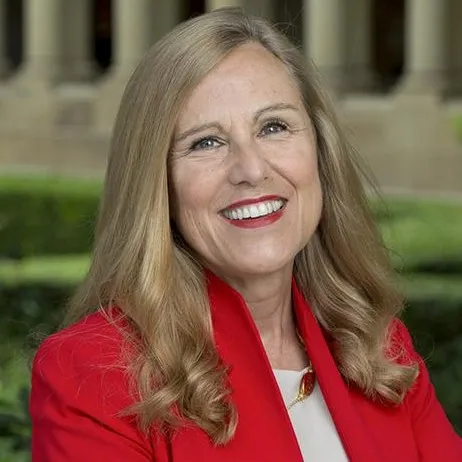
Campus: Improving Early Childhood Learning and Development, Hosted by STEP Alumna Liz Simons, AM '84
REGISTER HERE: http://pgnet.stanford.edu/goto/iltl_sv_reg
Join Dean Dan Schwartz and Professors Deborah Stipek and Rebecca Silverman for a community conversation on advancements and challenges in early childhood education.
From exponential early brain development to higher college completion rates and increased employability, research points to significant cognitive and societal benefits in investing in resources and programs for our nation's 24 million children under the age of six. Dean Schwartz and Professors Stipek and Silverman will shed light on how Stanford scholarship, practice, and community engagement are pursuing strategies to better understand and improve children’s learning and development.
All Stanford alumni and friends are welcome to attend.
This event is brought to you by the Stanford Graduate School of Education.
ABOUT THE SPEAKERS
Deborah Stipek is the Judy Koch Professor of Education in the Stanford Graduate School of Education and a professor, by courtesy, of psychology. She also serves as the Peter E. Haas Faculty Director of the Haas Center for Public Service at Stanford. From 2001 to 2012 and then again from 2014 to 2015 she served as the I James Quillen Dean of the GSE. She earned a doctorate in developmental psychology from Yale University. Prior to coming to Stanford, she was a faculty member at UCLA where she served for 10 of her 23 years there as the Director of the Corinne Seeds University Elementary School and the Urban Education Studies Center. During this period as a faculty member at UCLA she took a year off to work for U.S. Senator Bill Bradley. Stipek’s scholarship concerns instructional effects on children’s achievement motivation and learning, early childhood education, and elementary education. She is particularly concerned about learning opportunities for young children living in poverty. In addition to her research on instruction, she has been involved in education policy at the federal and state level. She currently chairs the Heising-Simons Development and Research on Early Math Education (DREME) Network.
Rebecca Silverman is an associate professor at the Stanford Graduate School of Education. Her research is focused on the language and literacy development and instruction of early childhood and elementary age children from diverse backgrounds. She is particularly interested in how to best support children who may have difficulty in learning to read and write, particularly children who have difficulty developing literacy due to language-related differences. She investigates how language skills like semantics, syntax, and morphology, influence reading and writing outcomes for both monolingual and bilingual children and which classroom practices are positively correlated with children's language and literacy development. Silverman conducts studies on interactive and extended read-alouds, peer learning, multimedia supports, and small group intervention. Silverman formerly taught at the University of Maryland’s College of Education after completing a doctoral degree in language and literacy at the Harvard Graduate School of Education. She also served as a 2017-2018 Fulbright Scholar in Yangon, Myanmar.
Daniel L. Schwartz is the I. James Quillen Dean and Nomellini & Olivier Professor of Educational Technology at the Stanford Graduate School of Education (GSE). An expert in human learning and educational technology, Schwartz oversees a laboratory whose computer-focused developments in science and math instruction permit original research into fundamental questions of learning. His book, The ABCs of How We Learn: 26 Scientifically Proven Approaches, How They Work and When to Use Them, distills learning theories into practical solutions for use at home or in the classroom. NPR noted the book among the "best reads" for 2016.
ABOUT THE IMPROVING LIVES THROUGH LEARNING TOUR
For more than 100 years, Stanford Graduate School of Education has been committed to rigor, daring, and relevance in education research, practice, and policy. The Improving Lives Through Learning Tour shares how the school continues to build upon that legacy through local conversations about the future of learning.
ABOUT LIZ SIMONS, AM '84
After graduating from the Stanford Teacher Education Program, Liz worked in Spanish-bilingual and English as a Second Language (ESL) classrooms and subsequently founded Stretch to Kindergarten, a spring-summer early childhood education program. In addition to serving on the GSE’s Advisory Council, Liz serves on the Leadership Council of Too Small to Fail and on several boards including The Marshall Project, The Foundation for a Just Society, Math for America, and the Learning Policy Institute
